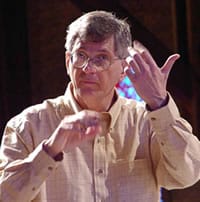Transforming Power

Today I have an interview with Hugh Ballou, a motivational speaker and former music minister. Hugh is the man behind the book Transforming Power. Here’s a blurb about the book:
Leaders who have lead a transformation share the story of their experience. This information is invaluable for leaders who are undertaking a transformation of an organization. The information in this book can be advantageous for anyone who is in a situation where they need to make a transformation – no matter what the mission the organization or the type of transformation.
The key to transformation is different for each individual, group, or congregation. Hugh Ballou has brought together a collection of over 25 articles and stories from individuals who have experienced real-life transformations of themselves or their institution. The inspiration offered from the words will enlist a sense of hope and perseverance during difficult times of change. Discover inspiration and transformation through the struggles of other leaders ranging from children’s ministry to being in prison, from making Hollywood movies to winning football games, to being leaders who truly lead.
I have mixed feelings about leadership. I struggle with what seems to be an overemphasis on leadership in some circles, as well as many of our leadership practices. However, I still believe that leadership of the right kind is important. Some of these tensions run through this book, so I thought it would be interesting to interview Hugh.

We have all kinds of books on leadership. What makes this one different?
Many books on leadership, including my other books, give the techniques, strategies, processes and the “How-To” facts for building leadership skills. This collection of stories from Transformational Leaders has been created to provide inspiration and encouragement for leaders by sharing stories of transformation. I currently teach leadership skills by sharing how I achieved results as a musical conductor over a 40-year career. Many of the skills are directly transferrable from conducting to corporate leadership and open up new paradigms for leaders to consider. For instance, a major drawback for strong leaders can be micromanaging competent team members. As an orchestra conductor, I would hire a good oboe player for an orchestra, but never attempted to tell that person how to play the oboe. I defined the tempo and shaped the final product as conductor and was ultimately in charge of the final product. The players wanted and needed specific targets for the final product and direction on how to come together to achieve that product. The leader in a corporate, non-profit, or church setting can learn from this model. Get the best people – give them a specific goal – direct the process, and give appropriate, timely feedback. This book contains leadership stories from many types of leaders including musical conductors. All the leadership principles contained in these stories are applicable in most, if not all situations. Good leadership is good leadership.
I appreciated many of the stories about transformational leaders. Were there any that took you by surprise?
I was pleasantly surprised by the story from William Willimon, author, keynote speaker, minister and bishop of a large United Methodist Conference in North Alabama. He is in the process of transformation. The system he inherited needed to be changed. There were and still are many obstacles to change including resistance to change itself. The challenge in this instance is very stressful on a leader. This can also create some doubt about the reason for and feasibility of the change. Many leaders find themselves doubting their own vision when the going gets tough. Willimon’s story is titled, “What If I Am Wrong!” It takes a lot of courage to share this, however, he was well aware that the story would be helpful to leaders in similar places with struggles or doubts of their own.
We saw all kinds of leaders in this book, including denominational leaders, pastors, music leaders, and ladies in a prayer group. Would you say that everyone can rise to be a leader, or is transformational leadership reserved for a certain type of person?
Transformational Leadership sees no limitations on who can use its methodology and strategy. It’s only in our own shortsightedness, that we fail to see opportunities within our grasp. Common shortcomings include, but are not limited to the following:
- Not clarifying a vision,
- Lack of self confidence,
- Failure to plan,
- Lack of trust in team strategies, and
- Not being willing to step up to a challenge.
The Transformational Leader is able to envision possibilities and is willing to nurture and support others. This will undoubtedly lead to success. The willingness to fail and learn from that failure is a fundamental leadership skill. Someone once noted that success is defined as getting up one more time than failing.
I noticed some tensions in the stories. Some argued for more of an aggressive, corporate kind of leadership. Some argued that Christian leadership should be different from the corporate model, and that we need patience while God works. What can we learn from these stories about the tension between these models of leadership?
Leadership skills must be consistent with the personality of the leader. A leader must find a method and process that is faithful to his or her personality. Corporate leaders have more consistently adopted a leadership model called “Servant Leadership” than church leaders. This is interesting since Servant Leadership comes from Biblical principles. The Servant Leader is similar to the Transformational Leader in several ways. Both styles of leaders are able to:
- Influence others with personal integrity not power of position,
- Train and empower others,
- Work through others,
- Assists others in successful task completion and,
- Get out of the way.
The Transformational Leader adds the dimension of being the cheerleader, charismatic influence, coach, and role model. Neither corporate leaders nor church leaders are excluded from either style of leadership. This is also true of the Autocratic Leader and Charismatic Leader. The church leader has a much more difficult job especially in working with volunteers. Accountability is a challenge in that setting. Working in a community of faith God gives us the vision. This points the motivation and the glory away from the leader – this is consistent with Transformation Leadership, which is about the vision and not the leader. God works in our midst as we permit. This applies to Christians transforming the workplace as well as those transforming the church. It applies to spiritual goals as well as life goals. The work of the leader springs from his or her core values.
What do you hope that this book accomplishes?
My hope is for leaders, potential leaders and team members to be inspired by possibilities. I also hope that they will be able to develop a vision for transforming organizations and people’s lives.
For More Information
You can get more information about Hugh at his website. You can read more about his book at Amazon. Hugh is offering some free bonuses if you buy his book at Amazon and then go to the book website.
I’ll have a few thoughts on this book, and on leadership, tomorrow.





